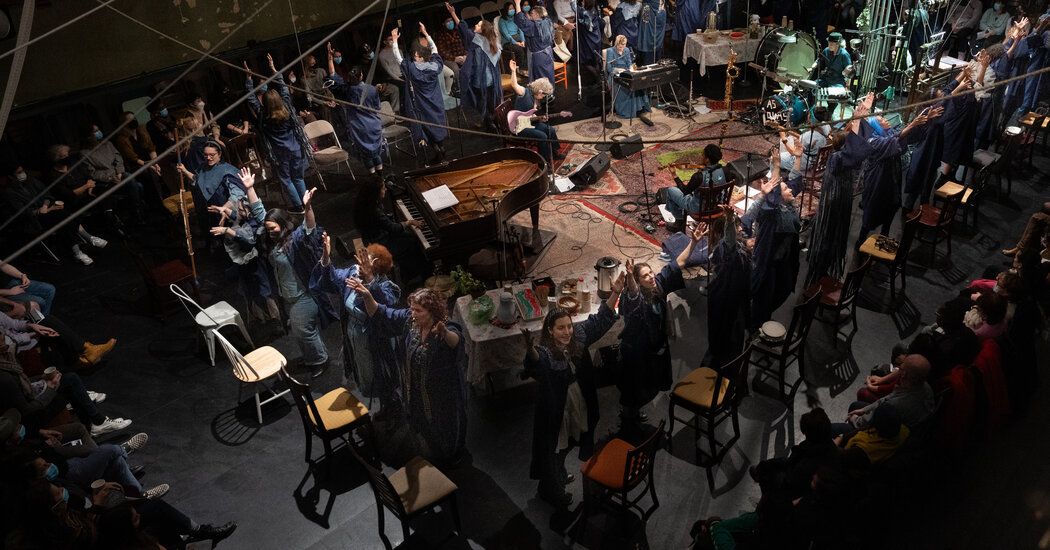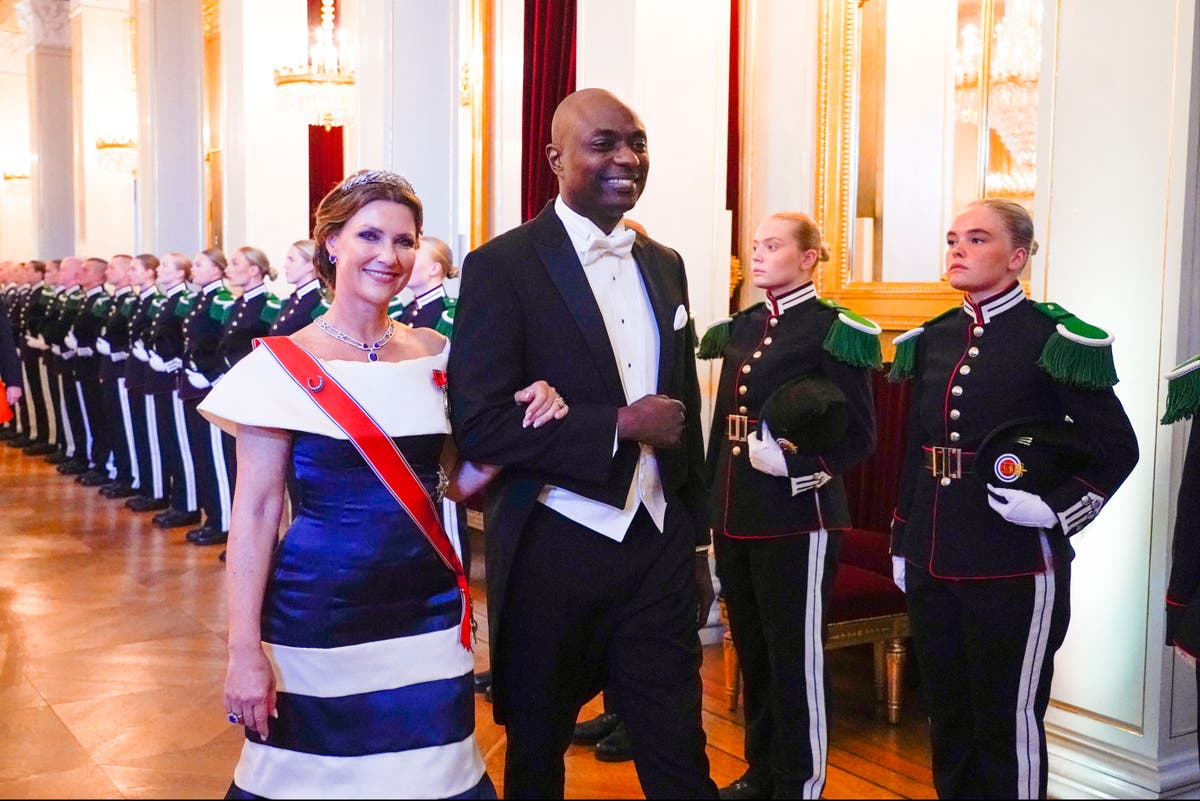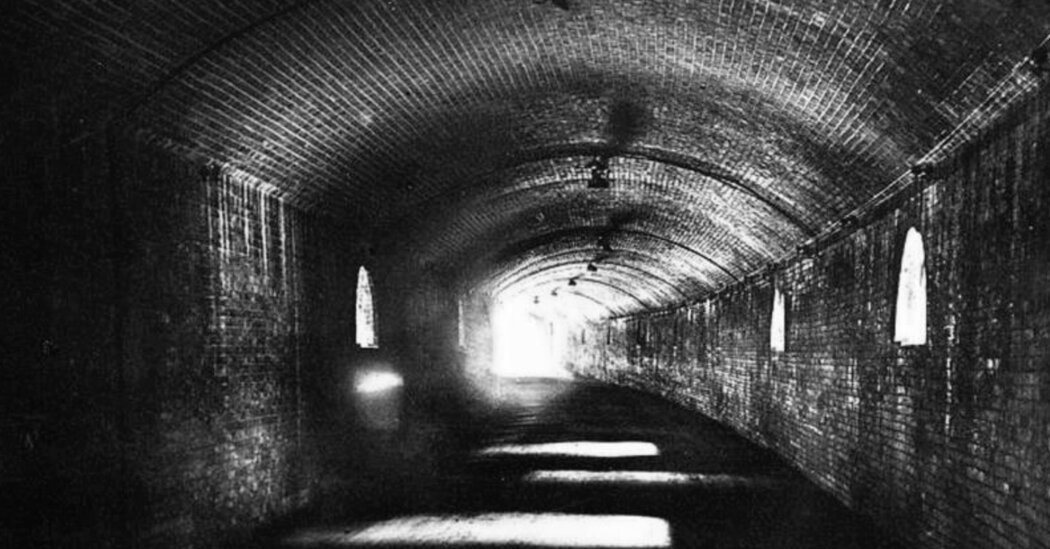“These people aren't drunk,” a choir in extravagant, personalized blue robes sang Saturday, “because it's nine in the morning.”
Watching these smiling performers at the illuminated Space at Irondale in Brooklyn, I was surprised to discover that this strikingly contemporary phrase was a translation of a Bible verse, Acts 2:15. And it was a fitting feeling, yes, around 9am.
In “Terce,” presented this year as part of the prototype festival of new opera and musical theater, about three dozen members of the choir prayed, as Christians have done at that time since the time of the early Church. The work is adapted and takes its name from the traditional 9 o'clock liturgy, the time at which it is believed that the Holy Spirit appeared to the apostles at Pentecost.
In Brooklyn, there is a twist, if not totally unknown: the divinity celebrated in this folk-soul-gospel-medieval amalgam is, according to the script, a woman, a mother, “an undeniably feminine creator.”
Politically charged, hectic, moving, deeply serious: “Terce,” created and directed by Heather Christian, embodies Prototype, now in its eleventh season and organized by Beth Morrison Projects and HERE, the arts center in SoHo. (The festival lasts until Sunday).
The hour-long performance had the intimacy that's crucial to this year's best festival offerings. Members of the community choir that Christian has organized sing, dance and play instruments just steps away from the audience around them. And whether it's the cold weather or constant bad news, that closeness feels sweet and reassuring this January.
It's also sweet and comforting in even cozier spaces at HERE, where Prototype presents “The Promise,” a rock-cabaret song cycle that Wende, a Dutch singer, conceived with a group of collaborators.
Among those creators is composer Isobel Waller-Bridge, perhaps best known for the music of her sister Phoebe's hit television show, “Fleabag.” And the lyrics of “The Promise,” the work of five writers, reflect a kind of “Fleabag” sensibility. They are the voice of a modern woman, single, fun, dissatisfied, morbid, ambivalent at best about having children, fussy but vulnerable. “I'm a lonely bitch,” goes the sad chorus of one song.
Restlessly stalking the small space and moving between the other three musicians, Wende has a mischievous smile that can quickly give way to mocking anger and quiet desperation. Her voice is taut and powerful but shaky, a bit like Fiona Apple's: sometimes sultry, sometimes airy and ironic. With artfully varied lighting by Freek Ros, the 19-song, 100-minute cycle continues to shift in tone and pace; songs with strong and propulsive jungle rhythms coexist with half-spoken vocals on the piano.
If the final minutes become cloying without falling apart, they have that in common with “Terce.” But just as the physical proximity of artists is welcome this season, so is some sentimentality. Wende somehow manages to create that oddity: a crowd sings anthems that even a hardened critic feels compelled to join.
“The Promise” and “Terce,” the Prototype releases I'm most reminded of this year, lack plot and personality. Also leaning abstract, but in a much wilder and more surreal mode, is “Chornobyldorf,” a sprawling production of more than two hours without interruptions at La MaMa's Ellen Stewart Theatre. It has bravely traveled from Ukraine as a kind of nostalgic reminder of the loud, messy, nudity-filled, often serious, and generally disconcerting spectacles that were once common in downtown New York.
The many-page synopsis describes an intricate genesis of this “archaeological opera in seven novels,” created by Roman Grygoriv and Illia Razumeiko. But the premise is similar to “Station Eleven,” the book turned TV show, and the play “Mr. Burns”: After an apocalypse (the Chernobyl nuclear disaster is the specter here), a society tries to rise from the ashes even though fragments of culture remain.
In the case of “Chornobyldorf,” this takes the form of revived but still distant memories of baroque opera and polyphonic singing, shot through with eruptions of wildly amplified punk rage. The texts are difficult to decipher. The costumes are made in ornate antique styles, but adorned with bits of electrical wiring, and the instruments, many of them handmade, are apparently a collection of what was left over when the world ended: percussion, trombone, flugelhorn, flute, folk music. stringed instruments such as the bandura and dulcimer, whispering accordions.
The soundscape crackles and roars, screeches and simmers, as this small society stages eerily robotic and intensely solemn rituals, building into a shouted mass and a climactic, hysterical dance macabre around a huge Lenin medallion hanging from the ceiling. . On a screen behind the artists, images from the film show outdoor scenes, in which nature looks majestic and almost completely abandoned by humans.
The slow, stylized pacing and insular symbolism, along with the vivid cinematic element and arcane eroticism, evoke Matthew Barney's “Cremaster” cycle. And although the work is loose, a dreamlike atmosphere takes over; It is difficult to say the exact meaning of a statuesque naked woman being stripped of the saucers hanging from her arms, but the sequence is nonetheless dazzling.
“Adoration” is the most standard proscenium theater opera that Prototype is presenting this year. Based on Atom Egoyan's 2008 film, the 90-minute piece, playing at the Sheen Center for Thought and Culture in Manhattan, plods through a complicated plot involving a teenager's announcement to his peers class that his father is a terrorist. (It turns out that he is not telling the truth, although it is never entirely clear what the narrative or emotional goal is.)
Setting the story to music offers the promise of delving into the nuances of a troubled group of people. But the sadly expository monologues go on and on in Royce Vavrek's leaden libretto. And while Mary Kouyoumdjian's score offers some sinuous string quartet music, its feverish quality seems generic and eventually dull; the drama, formless.
More compelling than any character in “Adoration” is Dominic Shodekeh Talifero, the performer and star of “Vodalities,” one of Prototype’s three short online streaming offerings, and he doesn’t even speak words or sing.
Accompanied for the piece's 16 minutes by the So Percussion quartet, he virtuously but subtly explores what he calls breath art, a delicate form of beat-boxing that inevitably and painfully suggests the rallying cry of Black Lives Matter. “I can't breathe.” (The other digital performances are “Swann,” a yearning aria based on the true story of a 19th-century black man in drag, and the playful, voice-processed “Whiteness.”)
Huang Ruo’s “Angel Island,” at the Brooklyn Academy of Music’s Harvey Theater, delves into the dark history of American discrimination and violence against Chinese immigrants, many of whom were prosecuted on Angel Island in the San Francisco Bay.
The structure of the 90-minute work is elegant: sections of historical narration, as in a Ken Burns documentary, alternate with poetic pieces for choir, with members of the Trinity Wall Street choir singing the words of the writings found on the walls of the immigrant houses of the island. processing center. Filling the back wall of the stage is a screen for film artist Bill Morrison's trademark, haunting manipulations of fuzzy, blurred archival footage, whose ghostly character is echoed by the floating, elegiac sound of the chorus.
The slow patience of Huang's score is a virtue, even if the sections tend to drag on too long, particularly the non-choral ones, with the narration over a string quartet cut to accompaniment to balletically aggressive duets for two dancers, one Asian. woman and white man.
But the gradual build toward a hypnotic conclusion was stirring, with choral repetitions as relentless as waves on a beach, punctuated by the slow, steady beat of a gong. He reminded me of “Terce,” which ends with the metallic sheen of a gently shaking chandelier made of keys and cutlery.
In both endings there was a sense of the potential of music and (community) performance to cleanse. To help us remember and move forward.












